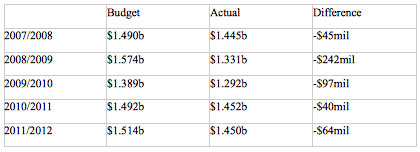NASSAU, The Bahamas — In framing the 2012/13 Fiscal Budget, the Government had to be mindful of the likely and reasonable progression of Recurrent Revenues in 2012/13, Minister of State in the Ministry of Finance Michael Halkitis said.
The significant carryovers from the previous Administration in respect of both Recurrent and Capital Expenditure, also added to the constraints on the Government, Mr Halkitis said during his contribution to the 2012/13 Budget Debate, Wednesday, June 6, 2012.
He said that it is widely known that Recurrent Revenues have persistently under-performed relative to forecast. Historical experience:

“This dismal performance was the result of a combination of poor forecasting and a lack of understanding of the economic realities,” Mr Halkitis said.
“In the face of consistently declining revenues, absolutely no effort was made to tailor expenditure to more closely match that was happening with the revenue. And we see the results.”
In preparing the forecast for Recurrent Revenues for 2012/13, this Administration chose to be prudent, he said.
The Government sets the ratio of Recurrent Revenue to Gross Domestic Product (GDP) at 18.3 per cent, only slightly higher than the 18.1 per cent level that it attained in 2011/12, Mr Halkitis said.
The Government has also chosen not to sell of off important Government assets as a means of garnering one-time, additional revenues. As such, there are no Capital Revenues built into the Government’s fiscal forecast for 2012/13, he said.
“The bottom line is that at $550 million, the GSF Deficit in 2012/13 is larger than the Government would have wished but, given the dire state of the fiscal accounts as this Administration came to office, and the commitments for capital expenditure (road works) made by the previous administration, the Government has little room to manoeuvre in the short time available.”
Mr Halkitis noted that the Budget Communication, did however, clearly chart the way forward in regards to the Government’s resolve in redressing the public finances.
“Realistically, we have no choice in this matter and there is little viable alternative.
He said, “In order to fully to fully implement the commitments that we have made to the Bahamian people in our Charter, and we will do so, we must do whatever is necessary to transform the public finances going forward in such a way that the sustainable financing of our commitments will be feasible. The repair of the public finances is priority number one.”
To that end, Mr Halkitis said, the Communication clearly outlined the fundamental fiscal challenge that must be addressed, namely the large negative gap in the Government’s Recurrent Account that has been allowed to develop over the past five years.
“Looked at from a different perspective, in the last five years, Recurrent Expenditure in relation to the size of the economy grew from 17.4 per cent to 21.3 per cent of GDP. However, the ratio of Recurrent Revenue to GDP only rose from 16.6 per cent to 18.1 per cent GDP,” he said.
Recurrent Expenditure thus grew by 3.9 points of GDP while Recurrent Revenue increased by only 1.5 points.
“As such, the imbalance in the Recurrent Account expanded by 2.4 percentage points of GDP, from 0.8 per cent in 2006/7 to 3.2 per cent in the last year of the former Administration,” he said.
“They were increasingly piling on borrowed upon borrowed dollar merely to cover everyday expenses which, in everyone’s financial textbook, is a formula for fiscal disaster.
“Once a vicious cycle of deficits and debt sets in, it feeds on itself and, without corrective action, inevitably spirals out of control.”
This Administration will implement measures to expand the economy and will also exercise vigilance in respect of expenditure and enhance public sector management in order to constrain the growth of Recurrent Expenditure relative to the growth of the economy, Mr Halkitis said.
By Llonella Gilbert
Bahamas Information Services


